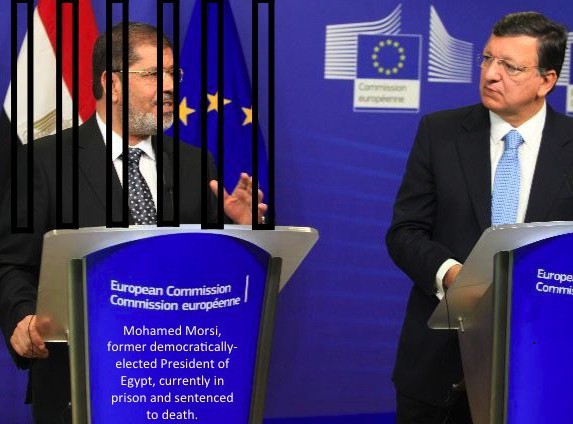In a statement posted on the EU’s External Action website late on Sunday, 17 May, Federica Mogherini, EU foreign policy chief, made it clear that the bloc stands firmly against the death penalty imposed on former Egyptian President Morsi and more than 100 of his supporters. In line with the EU’s policy on the death penalty, the standard response to all court rulings that deliver such a punishment says that it is cruel, inhumane and fails to act as a deterrent.
On Saturday, 16 May, a court in Cairo ruled against the ex-president, sentencing him to death for his escape from prison in 2011, while being detained during protests that toppled his predecessor, Hosni Mubarak. Two days later, Mr. Morsi managed to escape with what prosecutors believe to have been help from Hamas, the Palestinian faction designated as a terrorist organization by the EU and the US. The prison break triggered multiple riots, with thousands of inmates following Morsi’s lead and escaping themselves.
The Court’s verdict has sparked an array of criticism both at home and abroad. First to take up the baton were the high-ranking Muslim Brothers, who see in the verdict an act of revenge of the powers that be.
The Court’s decision will be finalised on 2 June, after the Grand Mufti, the highest religious authority in Egypt, has given his consultative opinion, as required by Egyptian law. In the meantime, the Court’s verdict has sparked an array of criticism both at home and abroad. First to take up the baton were the high-ranking Muslim Brothers, who see in the verdict an act of revenge of the powers that be. But by far the most vocal in condemning the ruling has been the Turkish President, Recep Tayyip Erdogan.
Mr. Erdogan’s reaction comes as no surprise, given the close ties his AK Party has with the Muslim Brotherhood. Addressing a rally in Istanbul, Mr. Erdogan came out strongly against the West for its double standards regarding the death penalty, saying that “while the West abolished the death penalty in their own countries, they just look on without taking any action against this execution in Egypt.” Furthermore, he called on the European Union to impose sanctions on Egypt following Saturday’s court decision.
“While the West abolished the death penalty in their own countries, they just look on without taking any action against this execution in Egypt.”, has remarked Turkish President Recep Tayyip Erdogan.
The EU followed suit and spoke out against the controversial ruling, albeit through the weak Mogherini statement mentioned earlier. Given its past reactions to similar court sentences, there was mounting expectation for the 28-member bloc to do so. It was only last February when Brussels slammed Egypt over the blanket death sentence delivered to 188 alleged supporters of the deposed Mohamed Morsi as punishment for the killing of 13 policemen in August 2013.
Mr. Morsi was Egypt’s fifth president, and the only one to have been elected democratically. After his election in June 2012, he began pushing for an Islamic-backed constitutional reform, a move that sparked fresh protests. The new Egyptian crisis continued well into the summer of 2013 when the military, under the command of Fatah al-Sisi, toppled Morsi, suspended the constitution and clamped down on the Muslim Brotherhood. Mohamed Morsi was soon brought to trial on several charges of inciting deadly violence, espionage and committing acts of terrorism.


